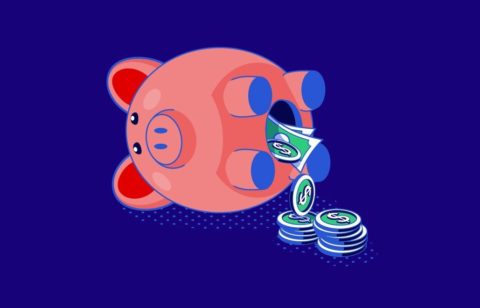
Have you considered a debt consolidation loan to deal with all your credit card bills? If so, you’re not alone.
Americans are carrying considerable amounts of debt these days. As of 2017, the average household carried over $16,000 in credit card balances, and total household debt in the United States is a staggering $12.73 trillion. For most people, this debt burden is both unsustainable and seemingly inescapable.
Many borrowers, as their credit card balances and minimum monthly payments rise, look for options to address their debt. Debt consolidation loans, especially at first glance, seem like a great option for borrowers in dire financial straits.
However, before choosing any method to address personal debt, borrowers should assess all of their options. Debt consolidation loans, like other debt remedies, may not be a good fit for a borrower’s particular situation. In some cases, taking a debt consolidation loan can make a bad financial situation even worse. Let’s explain what a debt consolidation really is and then look at five things you probably didn’t know about debt consolidation loans.
What is a debt consolidation loan?
Before borrowers even consider a debt consolidation loan, they should understand what it is.
A debt consolidation loan takes all of a borrower’s short-term debt – credit cards, personal loans, store cards, and so forth – and combines them into a single loan. The borrower then has only one loan payment to deal with each month, ideally at a lower interest rate than faced with all the original credit cards and loans. A debt consolidation loan does not lower the total amount of debt a borrower is carrying.
Borrowers obtain debt consolidation loans using a variety of methods. Homeowners, for example, often use a home equity line of credit (HELOC) to consolidate their debts. Other borrowers transfer their loan balances to a new credit card with a higher limit and a lower, often introductory, interest rate. Finally, many borrowers obtain personal loans from a bank or other lending institution to consolidate their short-term debts.
Many borrowers believe a debt consolidation loan is a good fit for their particular situation. Having a single loan payment, with a single due date, makes it easier for many people to manage their monthly bills. If a borrower obtains a lower interest rate on the new loan, the borrower’s monthly payments will be lower and more manageable as well. Two of the most challenging issues borrowers often face are paying their credit card bills on time and having enough funds on hand to make their minimum payments.
1. Consolidating your loans will keep you in debt longer
Borrowers normally seek lower interest payments when securing debt consolidation loans; this helps decrease the burden that loan repayment places on their monthly budgets. However, in doing so, the tradeoff is an extended repayment period and a longer time in debt. Borrowers will usually end up paying much more interest over time using loan consolidation than they would have using other debt repayment methods as well.
Holding an excessive amount of debt like this can make it more difficult to secure credit for other important life events, such as purchasing a home. A heavy debt load can also affect a borrower’s ability to get or hold certain types of jobs, especially in fields such as security and law enforcement. If getting out of debt fast is a borrower’s top goal, then a debt consolidation loan may not be the best option to consider.
2. Debt consolidation loans are for people who can pay their bills
People who are considering debt consolidation loans should consider whether they’ll have the capacity to make the loan’s single monthly minimum payment. If the answer is yes, then consolidating all debt into a single loan is a viable course of action. However, if borrowers are concerned whether they can make the monthly loan payments, then a debt consolidation loan may be a poor choice.
Borrowers cannot solve their debt problems with a new loan if they’re unable to make the monthly payments. A borrower who starts missing payments on the consolidated loan is in a worse position than at first. Missing loan payments will exacerbate a precarious financial situation and make it harder for the borrower to address problems with excessive debt. Borrowers who are already having serious troubles making payments on current credit card bills should consider other options to deal with their debts.
3. Using your home to secure a debt consolidation loan can be risky
Borrowers often use home equity lines of credit (HELOC), or other means involving their homes, to consolidate their debt into one loan. Using a home as collateral may be the most expeditious and affordable way for many people to secure credit. However, borrowing against a home for a debt consolidation loan also carries significant risk.
Borrowers who find themselves unable to make payments on a home equity loan can put their home in peril. Lenders can foreclose on borrowers who are in arrears on payments or take other measures that can worsen a borrower’s overall financial situation. Using home equity for a consolidation may be fast and affordable, but borrowers should weigh the risks before they use their home to secure their consolidated debt.
4. Beware of rising credit rates
When borrowers obtain a debt consolidation loan, they’re normally looking for the lowest interest rates possible, as low interest rates help keep monthly payments manageable. However, many lenders offer low introductory rates to attract borrowers, only to raise them after several months. A slight percentage point rise in a loan’s interest rate can often push a borrower’s budget past the breaking point.
Borrowers should pay close attention to the terms on any debt consolidation loan under consideration. Is that low interest rate fixed, or can the lender raise the rate later if it so desires? In many cases, the uncertainty that borrowers face when signing up for a variable rate loan is not worth the trouble.
5. Other options are available
When borrowers start considering debt consolidation loans, they’re often in a tough situation financially. In some cases, a debt consolidation loan may have been the only solution that borrowers considered to address their credit card bills. However, as discussed earlier, a debt consolidation loan may be a poor choice for many borrowers. Fortunately, there are other options available for people struggling to keep up with monthly minimum payments.
Some borrowers choose to get directly involved with their credit card companies and other lending institutions. Many creditors will work with borrowers on a case-by-case basis when they’re having problems paying back loans and credit card debt. These lenders are often willing to renegotiate borrowers’ interest rates or minimum payments to make debt repayment more manageable for them.
There are also nonprofit credit counselors available to assist people with debt problems. These counselors can help analyze a borrower’s financial situation and develop a debt management plan to help pay off excessive short-term debt. Credit card counselors’ services are often free. The counselors also provide education and advice to help steer people away from hazards associated with excessive debt as well. For borrowers who believe they have the means to address their debt situation but lack the expertise, credit counseling is a good option to consider.
Another venue borrowers can take to tackle heavy debt is the debt settlement process. Under this option, borrowers hire a debt relief company to negotiate all repayment terms with their creditors. They cease making any debt payments and instead make monthly deposits in a trust fund at the direction the debt relief company. Once the debt relief company obtains agreements with the borrower’s creditors, that trust fund helps initiate the borrower’s long-term debt repayment plan.
Finally, there is the bankruptcy option. Bankruptcy is the most severe method for addressing personal debt. Only borrowers that are in dire financial situations with no hope of ever paying their debt back should consider this route. Under bankruptcy, borrowers either liquidate all their assets to pay creditors or have their debt reorganized and consolidated. Borrowers who undergo a bankruptcy will often have difficulty obtaining credit for years afterward and will pay much higher rates for any credit they do secure.
As borrowers review options to address their excessive debts, they often consider debt consolidation loans. While a debt consolidation loan may be a good route for some borrowers, it may actually worsen the situation for others. Using collateral to secure a consolidation loan can even put assets such as your home at risk.
Before deciding on a course of action to tackle short-term debt, borrowers should carefully consider all the options available. Doing so will help ensure that their efforts improve their financial situations and provide them even more opportunities for the future.





